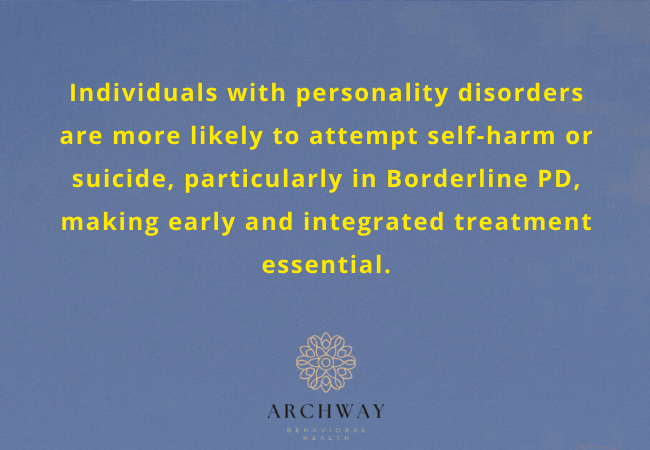Personality disorders affect every layer of a person’s life—from how they perceive themselves and others to how they think, feel, and interact with the world. These disorders aren’t temporary or occasional—they are persistent patterns of dysfunction that, without treatment, can lead to lifelong emotional pain, unstable relationships, isolation, and significant impairment.
But treatment is not only possible—it can be transformative.
At Archway Behavioral Health, we provide a full continuum of care for individuals struggling with personality disorders. We believe in a comprehensive, whole-person approach that combines the best of individual therapy, group support, and psychiatric care. Through modalities like Cognitive Behavioral Therapy (CBT) and Dialectical Behavior Therapy (DBT), supported by medical oversight and structured programming such as our Intensive Outpatient Program (IOP) and Partial Hospitalization Program (PHP), clients develop real tools for long-term recovery.
This guide explains the most effective approaches to personality disorder treatment, how therapy and psychiatry work hand-in-hand, and what lasting recovery looks like at Archway—the trusted Mental Health Treatment Center in Florida.
What Are Personality Disorders?
Personality disorders (PDs) are mental health conditions involving maladaptive, inflexible patterns of thinking, feeling, and behaving. These patterns affect a person’s relationships, self-image, and ability to function. Unlike situational mood changes or temporary stress reactions, personality disorders are chronic, often beginning in adolescence or early adulthood.
Common Features of Personality Disorders:
- Difficulty with emotional regulation
- Unstable or intense relationships
- Identity disturbance or lack of consistent self-image
- Impulsivity or risk-taking behaviors
- Patterns of mistrust, detachment, or dependency
- Distorted beliefs about oneself and others
Types of Personality Disorders: Three Clusters
Cluster A: Odd or Eccentric Behavior
- Paranoid PD: Pervasive distrust and suspicion of others
- Schizoid PD: Detachment from relationships and emotional expression
- Schizotypal PD: Social anxiety, magical thinking, and eccentric behavior
Cluster B: Dramatic, Emotional, or Erratic Behavior
- Borderline PD: Emotional instability, fear of abandonment, impulsive behavior
- Narcissistic PD: Grandiosity, need for admiration, lack of empathy
- Antisocial PD: Disregard for the rights of others, manipulation, aggression
- Histrionic PD: Excessive emotionality, attention-seeking, shallow relationships
Cluster C: Anxious or Fearful Behavior
- Avoidant PD: Hypersensitivity to criticism, social inhibition
- Dependent PD: Excessive need for care, fear of separation
- Obsessive-Compulsive PD (OCPD): Preoccupation with control, perfectionism, orderliness
Many individuals with personality disorders also experience co-occurring conditions, such as anxiety, depression, PTSD, substance use, and bipolar disorder—making integrated care crucial.
Why Therapy and Psychiatry Must Work Together
Personality disorders involve deep-rooted emotional and behavioral patterns. They often resist quick fixes or medication alone. True healing requires a combined approach that addresses both the psychological and biological components of these disorders.
At Archway Behavioral Health, we offer:
- Evidence-based therapy for emotional and behavioral change
- Psychiatric support to reduce symptom intensity and improve daily functioning
- Structured programs (PHP and IOP) that support real-world application
This blend of therapy and medical care forms the foundation for sustainable recovery.
Core Therapeutic Approaches at Archway
Individual Therapy in Florida: Rewiring Emotional Patterns
Personality disorders can cause individuals to struggle with self-worth, boundaries, emotional regulation, and trust. One-on-one therapy helps clients:
- Understand the origins of their patterns (attachment issues, trauma, learned behaviors)
- Develop self-awareness and emotional insight
- Identify triggers and build coping skills
- Rework distorted beliefs about self and others
- Develop healthier interpersonal strategies
Our therapists are trained in trauma-informed care, CBT, DBT, and relational approaches—adapting treatment to each client’s personality structure.
Group Therapy in Florida: Healing Through Connection
Because personality disorders often impair relationships, group therapy is essential. It provides:
- A safe environment for practicing new behaviors
- Real-time feedback and peer support
- Opportunities to build empathy, assertiveness, and self-expression
- Experience with conflict resolution and boundary-setting
Archway’s groups are highly structured and therapist-led, ensuring a respectful and growth-oriented environment.
Cognitive Behavioral Therapy in Florida (CBT)
CBT helps individuals identify and challenge the thought distortions that fuel dysfunctional behavior. For example:
- A client with Avoidant PD might believe “I’ll never be good enough.”
- A client with Paranoid PD might assume “Everyone is out to get me.”
Through CBT, clients learn to:
- Reframe negative beliefs
- Reduce emotional reactivity
- Identify automatic thoughts and cognitive biases
- Develop rational, evidence-based thinking patterns
CBT is particularly useful for Cluster C disorders, and for managing co-occurring anxiety and depression.
Dialectical Behavior Therapy in Florida (DBT): Mastering Emotions
DBT is the gold standard for Borderline Personality Disorder, but it’s effective for many PDs involving emotional dysregulation or impulsivity.
DBT Skills Clients Learn:
- Mindfulness: Stay grounded in the present moment
- Emotion Regulation: Understand and manage overwhelming feelings
- Distress Tolerance: Survive emotional crises without self-destructive behaviors
- Interpersonal Effectiveness: Maintain self-respect while navigating relationships
At Archway, clients practice DBT in both individual and group settings, with daily integration in IOP and PHP programs.
Psychiatric Care for Personality Disorders
While therapy addresses long-term behavioral patterns, psychiatric care helps stabilize acute symptoms that interfere with progress.
Common symptoms managed with medication include:
- Anxiety
- Depression
- Irritability or rage
- Sleep disturbances
- Impulsivity or dissociation
Psychiatric Services Include:
- Initial psychiatric evaluation and diagnosis
- Ongoing medication management
- Medication education and side-effect monitoring
- Collaborative care with therapists for holistic planning
Common Medications Used:
- SSRIs/SNRIs for depression, anxiety, and emotional lability
- Mood stabilizers for bipolar symptoms or impulsivity
- Low-dose antipsychotics for severe agitation or disorganized thinking
At Archway, medication is not a standalone solution, but part of a well-rounded treatment plan.
Structured Treatment: PHP and IOP for Personality Disorders
For many, weekly therapy alone is not enough. Our structured outpatient programs offer daily therapeutic immersion while allowing clients to return home each evening.
Partial Hospitalization Program in Florida (PHP)
Best For:
- Clients with intense emotional instability
- Those stepping down from inpatient care
- Individuals at risk of hospitalization or self-harm
Includes:
- 5–6 days/week, 6+ hours/day
- Daily individual and group therapy
- CBT, DBT, and trauma-informed care
- Psychiatric care and medication support
- Psychoeducation and life skills training
- Family and relational support
Intensive Outpatient Program in Florida (IOP)
Best For:
- Clients with moderate to significant symptoms
- Those needing structure while returning to work/school
- Individuals transitioning from PHP
Includes:
- 3–5 days/week, 3–4 hours/day
- Weekly individual therapy
- Daily DBT and CBT groups
- Psychiatric medication management
- Support for co-occurring anxiety, depression, or trauma
IOP allows for flexibility while maintaining therapeutic intensity.
Additional Support Services at Archway
We don’t just treat diagnoses—we support the entire person. Additional services include:
- Case management
- Family counseling
- Nutritional guidance
- Peer support groups
- Relapse prevention and crisis planning
- Aftercare and alumni programming
These wraparound supports help clients maintain progress outside of therapy and transition back into their lives with strength and clarity.
Why Choose Archway Behavioral Health?
We are more than a mental health treatment center—we are a place of transformation and trust.
What Makes Archway Different:
- Clinicians trained in complex personality disorder treatment
- Seamless integration of therapy and psychiatric care
- Personalized, trauma-informed care
- Expertise in CBT, DBT, and medication management
- Multiple levels of care (PHP, IOP, outpatient)
- A warm, inclusive, and nonjudgmental environment
Whether you’ve struggled for years or are newly diagnosed, we offer the tools, community, and guidance to help you thrive.
Conclusion
Living with a personality disorder can feel overwhelming—but with the right treatment, support, and understanding, lasting change is not only possible—it’s within reach. You are not defined by your diagnosis. With compassionate therapy, expert psychiatric care, and structured programs like IOP and PHP, you can develop the tools to regulate emotions, build healthier relationships, and live a more grounded, fulfilling life.
At Archway Behavioral Health, we walk alongside you through every step of your healing journey. Whether you’re struggling with Borderline Personality Disorder, Avoidant Personality Disorder, or any other complex condition, our team is here to provide the specialized, evidence-based care you deserve. Call us today at 888.488.4103 to schedule your free, confidential assessment—and take your first step toward clarity, confidence, and control.
Frequently Asked Questions (FAQ)
What is the most effective treatment for personality disorders?
The most effective treatment combines evidence-based therapy (such as DBT or CBT) with psychiatric care. At Archway Behavioral Health, we create individualized plans that address emotional regulation, thought patterns, and any co-occurring conditions.
Can personality disorders be cured?
While personality disorders are long-term conditions, treatment can significantly reduce symptoms, improve quality of life, and help individuals build stable relationships. Many clients see lasting improvement through consistent therapy and psychiatric support.
What therapies work best for Borderline Personality Disorder?
Dialectical Behavior Therapy (DBT) is the gold standard for treating Borderline Personality Disorder. It focuses on emotion regulation, distress tolerance, and improving relationships—skills taught daily in our IOP and PHP programs.
What is the role of medication in treating personality disorders?
Medication doesn’t cure personality disorders but can help manage co-occurring symptoms such as anxiety, depression, impulsivity, or mood swings. Our psychiatric team provides personalized medication management as part of each treatment plan.



